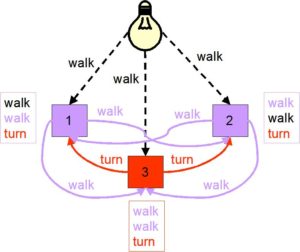This approach exploits the parallel processors of CKBot structures with a distributed voting scheme, to override bad data or modules with faulty sensors or somehow faulty processors. In particular, this work focuses on fault tolerant distributed control through collective decision making. By sharing information and making decisions as a group, the system is more robust in the case of failures (in this work, IR communication reception). Our basic approach is for a group of modules all observing one signal to share the observed data and determine the best decision, even if some of the modules have faulty IR receivers or communication failures. This method, known as triple modular redundancy, was proposed by Von Neumann in the 1950’s and has since been treated extensively to improve the reliability of digital systems.
Publication
-
![[PDF]](https://www.modlabupenn.org/wp-content/plugins/papercite/img/pdf.png) M. Park and M. Yim, “Distributed control and communication fault tolerance for the ckbot,” in Asme/iftomm international conference on reconfigurable mechanisms and robots (remar 2009), London, UK, 2009, pp. 682-688.
M. Park and M. Yim, “Distributed control and communication fault tolerance for the ckbot,” in Asme/iftomm international conference on reconfigurable mechanisms and robots (remar 2009), London, UK, 2009, pp. 682-688.
[Bibtex]@inproceedings{MP:MY:09, author = {M. Park and M. Yim}, title = {Distributed Control and Communication Fault Tolerance for the CKBot}, booktitle = {ASME/IFToMM International Conference on Reconfigurable Mechanisms and Robots (ReMAR 2009)}, year = {2009}, pages = {682-688}, month = {June}, address = {London, UK}, pdf = {http://modlab.seas.upenn.edu/publications/CKBot_Distributed_IR_Submit_Final.pdf} % doi not found }
